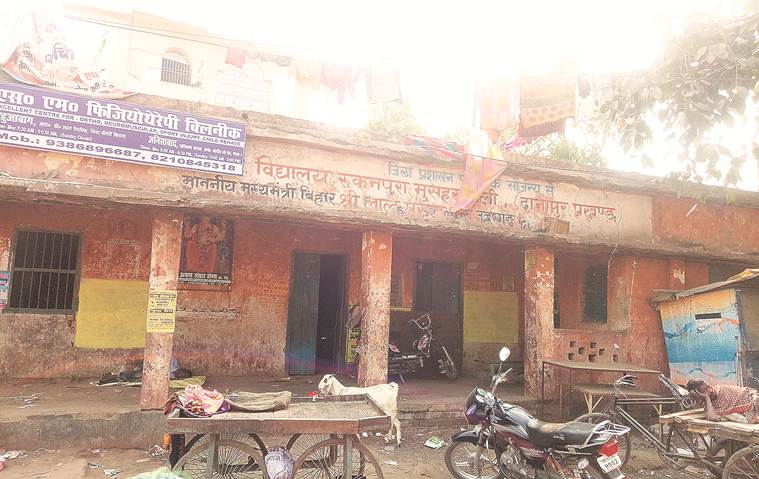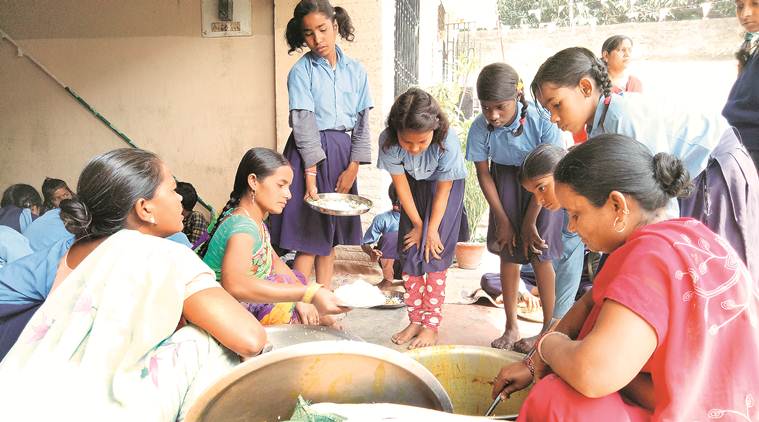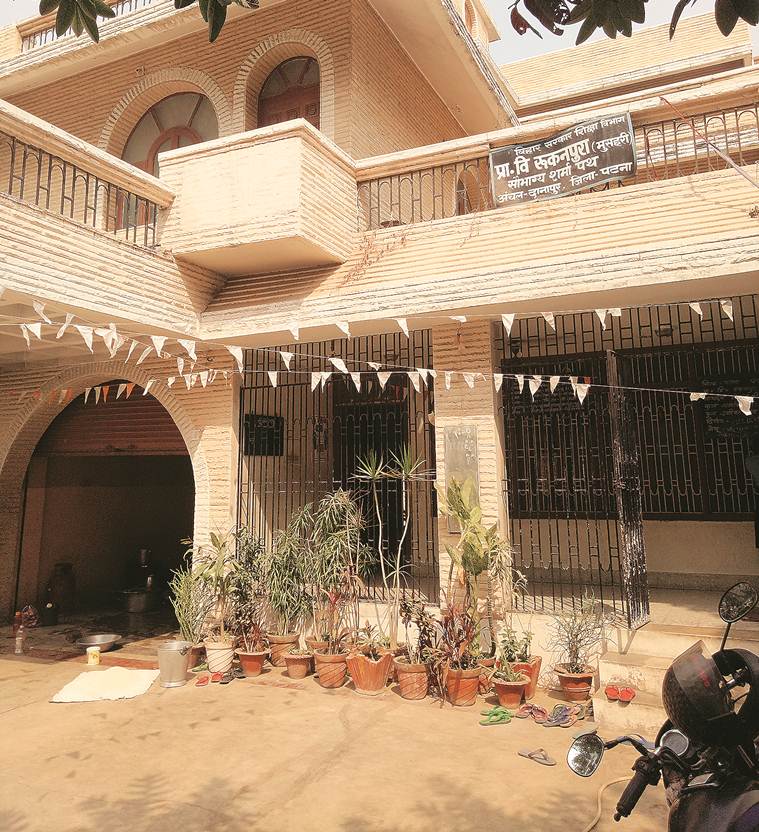
It is 9.30 am. Primary School Rukanpura (Mushahari), Danapur, Patna, is bustling with activity. Out of the 133 students enrolled from Classes 1 to 5, 57 of them boys, 77 have turned up.
It is after some days that the school is seeing substantial attendance. On January 7, 2.18 lakh mid-day meal cooks in government schools across the state had gone on strike demanding increase in wages and payment for the whole year instead of for 10 months, taking into account the days when the schools are shut. The strike lasted 39 days and, across Bihar, saw a fall in school attendance.
Rukanpura school’s three mid-day meal cooks were among those who joined the strike. The cooks returned to work after the Bihar government announced a hike of Rs 250, and assured the Bihar Rajya Madhyan Bhojan Rasoiya Sanyukta Sangharsh Samiti, an association of mid-day meal cooks, that it would urge the Centre for a pay hike.
Most of the students at the Rukanpura school belong to Scheduled Caste or Extremely Backward Class families, living within a 2 km area around. Most are children of daily wagers or drivers.
At the kitchen, Aarti Devi is fretting. Waiting for the other two cooks, Sita Devi and Poonam Devi, to arrive, she starts cleaning the 18 ft-by-10 ft kitchen. As per the weekly chart, today’s mid-day meal menu is black gram with mashed potatoes and pulao. Aarti hopes to have the cooking underway by 10.45 am, in time for the 12.40 pm lunch break.
After the state government’s hike, the three cooks will get Rs 1,500 per month. Putting some black gram daal to boil in a large container with some potatoes, Sita Devi (38), whose husband Bachchu Kumar is a driver, says the only reason she works at the school is that it allows her to spend some time with her two younger children, Priyanshu and Nitish Kumar, who are in Classes 4 and 3 in the same school. “Otherwise, the money is peanuts for six hours of work.” She has two elder daughters, Nisha and Nitu, who study in Classes 8 and 6 in a school nearby. She named her son Nitish Kumar after the Bihar Chief Minister, “impressed with his works”, she adds.

As she fries some onions in a pan, Sita says they are grateful for the LPG cylinder. For six months after she joined the school last year, she cooked using wood. The smoke troubled not just her but also the children, Sita says.
Poonam Devi, who is busy mashing the potatoes that are now boiled, says she will mix the same in the daal. “This makes the gravy tasty and thick. As we get a fixed quantity of gram, we have to find a way.” While 100 gm per student is the calculation for the rice, the cooks make a vague estimate regarding the daal needed, about 1.5 kg per meal.
Teacher Kavita Kumari Prasad says the government has increased the mid-day meal allocation per day per child: a hike of 22 paise for Classes 1 to 5, from Rs 4.13 to Rs 4.35. Recently, the Centre also enhanced the budget for kitchenware from Rs 5,000 to Rs 10,000 for primary schools.
The most vocal of the three cooks, Poonam, 39, who has been working at the school since 2010, says: “Our salary should at least be Rs 5,000 per month. In six hours we give to this school, we can work in three houses as helps and earn Rs 5,000. We work here because we feel part of a school, it gives us a sense of pride. But pride does not fill stomachs.”
Poonam’s husband Sanjay Paswan is a daily wager. They moved to Rukanpura in 2005, from a village near Patna, for their children’s education. While their daughter Jyoti studies in Class 9 at a government school, son Satyam, in Class 4, goes to a private school.
Talking about the recent strike, Poonam says the cooks’ association is getting stronger.
“We have good numbers. Just as teachers fought with the government (for higher wages), we will also get justice someday.”
Aarti Devi (28), who is putting the rice for cooking — “8 kg should be enough”, she estimates — will add a dash of cumin seeds to make it a “pulao”. “This is not the rich pulao of parties. With our resources, we can only manage token pulao. But it tastes good,” she says.
Aarti’s two daughters, Muskan and Mahi, are in Classes 4 and 3 in the same school. Aarti has been working as a cook here since 2015. Her husband Janardhan Singh is a labourer.
Hoping that the government would at least start giving them full year’s salary, Aarti says she is happy though about the new school building. “No Bihar school at this level would have such a building. Besides, all the teachers are very supportive.”
Since August 2011, the Rukanpura school is being run from the three-storey house of an IAS officer suspended on corruption charges. It was the first school to shift into such a property, after provisions of the Bihar Special Courts Act, 2009, under which the property of a corruption-accused public servant could be confiscated during trial, came into effect.
In August 2011, the Bihar Education Department put all the belongings of the suspended bureaucrat in a room on the second floor and gave the rest to the school.
The old building — a dilapidated two-room structure, with its grounds taken over by locals for parking and by food vendors —is just 700-odd metres away. The kitchen functions from what used to be the IAS officer’s garage.

After the 2013 Chhapra mid-day meal tragedy, in which 23 children had died after consuming toxic soyabean curry, the state government had instructed all school teachers and cooks to taste mid-day meals before serving to students. Besides, school principals were instructed not to store rice and pulses for long to ensure these were not infected, and gave schools boxes for storage.
Rukanpura school authorities say they try to keep as little in stock as possible.
It is 12.45 pm, time for lunch. Students of Classes 1 to 3, who have brought steel plates from homes, line up outside the kitchen. Poonam collects the plates and serves the food, and the children squat on the ground either in the kitchen or outside to eat.
From experience, Sita Devi says, only one-third of the students will ask for a second helping. “We give enough in the first round itself,” adds Aarti, with an eye on the stock of daal, which is depleting fast. Chhole-pulao, zeera-chawal and soyabean potatoes are among the favourite foods at the school.
Mid-day Meal Deputy Director, Bihar, Jeevendra Jha admits the resources are limited. “This is a Central scheme. We used to pay Rs 250 per month to the cooks, and the Centre gives Rs 1,000. We have been writing to the Centre about the cooks’ demands.”
Around 1.45 pm, the lunch gets over. Students rush to wash their plates. As they empty the cooking utensils to clean, Poonam says, “We cannot leave before 3 pm. We have to keep everything in order for the next day.”
Back in a ground floor hall, classes have resumed. As the Bihar board’s Class 10 exams are on, two of the six teachers of the Rukanpura school are on exam duty. With the headmistress on leave and another teacher on maternity leave, there are only two teachers today, Ashwani Kumar and Kavita Kumari Prasad. So they are holding a “combined class”, of all the classes.
With 77 children sharing one jute mat in a 22 ft-by-12 ft hall, it is noisy. Prasad gives different classes separate tasks to keep them busy — writing tables to Classes 1 to 3, revising Hindi texts to Classes 4, 5.
Munna Kumar, a Class 5 student, has one question. He walks up to Ashwani Kumar and asks if the school can be upgraded to Class 8. “It is a good school. It is run from a good place and is near our homes,” he urges.